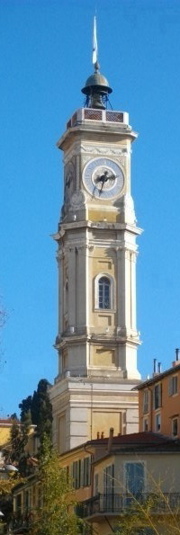Nice is, like all the French Alps, in an active sismic area. The risk in the city is rated 3 on a scale of four. Noone can foresee earthquakes, neither their dates, nor their magnitude.
It is measured with the Richter scale. One point more means an amplitude 10 times higher. In Nice, the last earthquake which caused a lot of damages occured 150 years ago with a magnitude of 6.5 causing damages rated VII-VIII in the MSK scale (which measures the damages, not the magnitude). This 1887 earthquake who was centered in Italy had caused a tidal wave more than 2m high. That's 500 times below what happened in japan in 2011. It killed more than 600 people nonetheless.
In the past, the region had suffered from earthquakes causing more important damages (IX-X on the MSK scale), such as the earthquake which emptied Roccasparviera.
The problem in Nice is that many, not to say most of the buildings are not earthquakeproof, unlike Japanese buildings for exemple.
Most of the earthquakes here are completely unnoticed by the population. Once in a while a magnitude 4 seism shakes the ground, making the headlines in the local newspapers, but no damage.
Don't worry about earthquakes if you come in our region. The big one may happen any time, but it is likely to be much smoother than the Californian one.
To know the activity of the last 15 days in France.
What to do during an earthquake…
In a building
- Stay far from the windows which may explode.
- Find a shelter under a furniture or at the corner between 2 structural walls
In the street
- Stay away from buidings
In a car
- Pull over and do not get off before the earthquake is over
What to do after the first tremors…
In a building
- Listen to the radio (France Inter 100.2 FM)
- Shut down water, gaz and electricity
- Keep with you essential items : medicines, papers, bottles of water, warm clothes...
- Exit the building using the stairs, being cautious because objects might fall. NEVER use the lifts!
- In case you're buried, make noise hitting walls and pipes.
In a car
- Move away from buidings and head towards an isolated place.
What not to do during an earthquake…
In a building
- Run during the tremor
- Smoke (risk of gas leak and explosion)
In the street
- Stay under power lines or what might collapse : bridges, roofs, balconies...
- Touch the power lines on the ground.
What not to do after the first tremors…
Ina building
- Use a lift
- Phone (let the network available for the rescue teams, gas leak...)
In the street
- Enter a damaged building to find people or fetch things.



